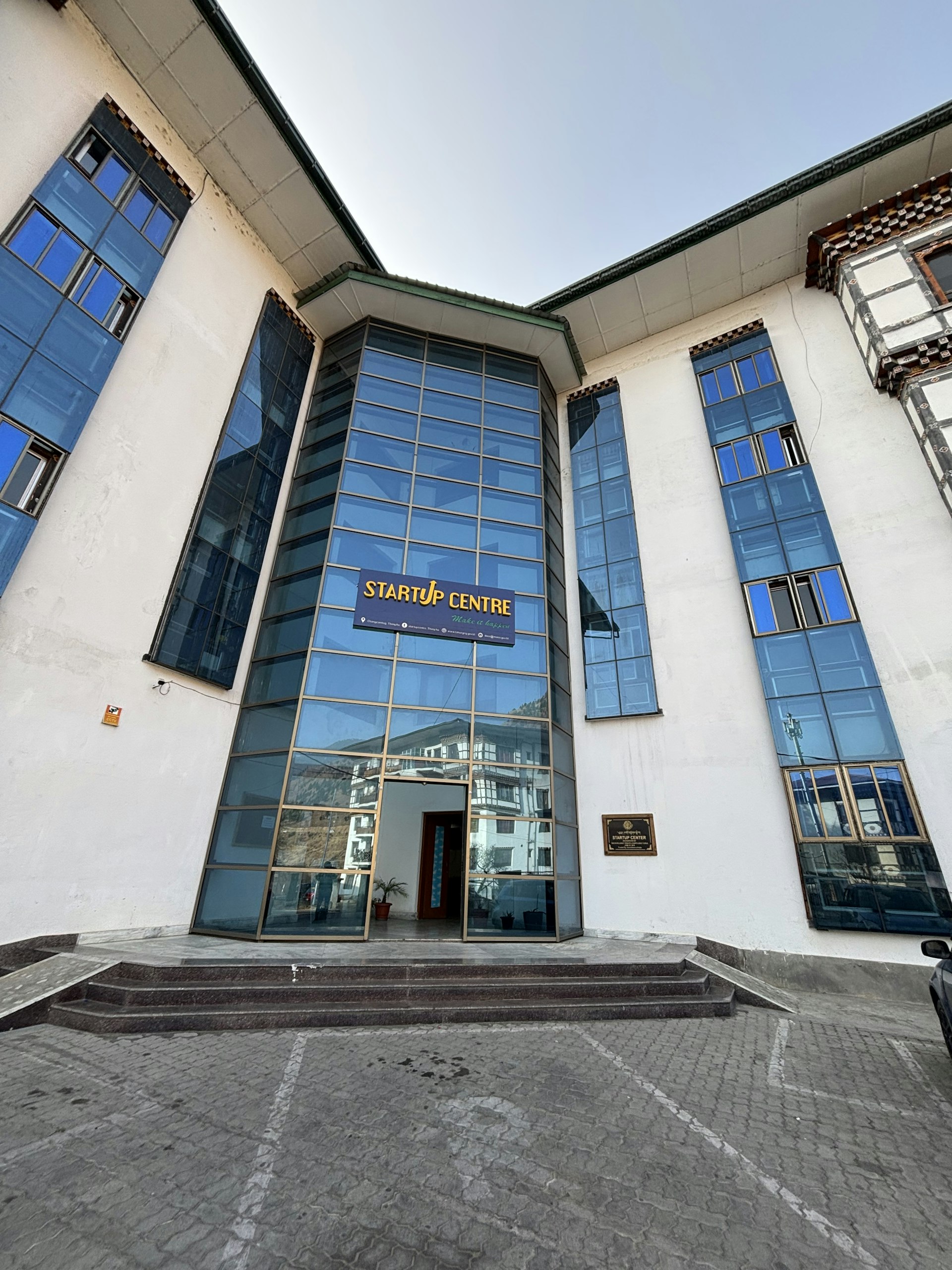11. Februar 2025 · Campus
BEEP – ein Bildungsprojekt mit nachhaltiger Wirkung
Mit dem Bhutan Entrepreneurial Education Program (BEEP) bringt die HWZ Schweizer Wirtschaftsexpertise ins Himalaya-Königreich, um nachhaltige Geschäftsideen zu fördern. Dr. Hugo Bigi, Fachreferent und Hauptdozent an der HWZ, war als Programmleiter vor Ort, um mit den Verantwortlichen die nächsten Schritte zu planen. Wir haben mit ihm gesprochen, um mehr über das Programm und seine Eindrücke aus Bhutan zu erfahren.

You can find the English translation of the interview below.
Hugo, du warst erst kürzlich in Bhutan. Was hat dich dorthin geführt?
Bhutan ist ein faszinierendes Land, ein buddhistisches Königreich im Himalaja mit einer einzigartigen Wirtschafts- und Gesellschaftsphilosophie. Es ist das erste CO₂-negative Land der Welt. Ich hatte die Gelegenheit, vor Ort Gespräche mit Regierungsvertretern, Bildungseinrichtungen und Unternehmern zu führen, um die Bedürfnisse der lokalen Wirtschaft besser zu verstehen. Besonders im Fokus stand unser neues Bildungsprojekt, das Bhutan Entrepreneurial Education Program (BEEP), das wir gemeinsam mit dem Department for Employment and Entrepreneurship (DoEE) innerhalb des Ministeriums für Industrie, Handel und Beschäftigung (MoICE) in Bhutan entwickeln. Mein Besuch diente dazu, die strategische Partnerschaften zu festigen und die nächsten Schritte für die Pilotphase des Programms, die diesen Sommer stattfindet, vorzubereiten.
Was hat es mit dem Bhutan Entrepreneurial Education Programm, kurz BEEP, auf sich?
BEEP ist ein strategisches Projekt der HWZ, das darauf abzielt, innovative unternehmerische Bildung nach Bhutan zu bringen – angepasst an die lokalen Gegebenheiten und Werte des Landes.
Bhutan Entrepreneurial Education Programm

Das Besondere an BEEP ist die Kombination aus Schweizer Wirtschaftsexpertise und bhutanischer Kultur, insbesondere den Prinzipien des Bruttonationalglücks. Das Programm soll bhutanische Unternehmer:innen befähigen, nachhaltige Geschäftsideen zu entwickeln und wirtschaftliches Wachstum zu fördern, das sowohl sozial als auch ökologisch verantwortungsbewusst ist. Dabei vermitteln wir nicht nur klassische betriebswirtschaftliche Kompetenzen, sondern setzen auch auf Innovation, Digitalisierung und ethisches Unternehmertum.
Gleichzeitig bietet BEEP wertvolle Erkenntnisse für die HWZ und die Schweiz: Die Erfahrungen mit nachhaltigem Unternehmertum in Bhutan können als Inspiration für hiesige Unternehmen dienen, insbesondere in den Bereichen verantwortungsvolle Geschäftsmodelle, gemeinwohlorientierte Innovationen und langfristige wirtschaftliche Stabilität. Das Zusammenspiel von wirtschaftlichem Erfolg und gesellschaftlicher Verantwortung in Bhutan zeigt neue Perspektiven auf, die auch in der Schweizer Wirtschaft zunehmend an Bedeutung gewinnen.
Es ist nicht das erste HWZ-Projekt in Bhutan. Wie ist die Idee entstanden, Bhutan mit Schweizer Bildungs- und Wirtschaftsexpertise zu unterstützen?
Genau, unser Engagement in Bhutan begann vor 16 Jahren mit dem Bhutan Middle Management Hotel Program (BMMHP), das die HWZ in Zusammenarbeit mit Partnern aus der Hotellerie ins Leben rief. Das erfolgreiche, vom ehemaligen HWZ-Prorektor Urs Dürsteler initiierte Programm hat eindrucksvoll gezeigt, dass in Bhutan ein erheblicher Bedarf an praxisnaher und qualitativ hochwertiger Wirtschaftsbildung besteht. Die Idee für BEEP entstand aus dem Bedarf, diese Unterstützung auf eine breitere unternehmerische Ebene auszuweiten. Bhutan steht vor der Herausforderung, seine Wirtschaft zu diversifizieren – und genau hier kann sich die HWZ mit ihrer Expertise unterstützend einbringen. Wir sehen uns als Brückenbauer zwischen zwei Welten: Auf der einen Seite die tief verwurzelten Werte Bhutans, auf der anderen Seite das Wissen und die Best Practices aus der internationalen Wirtschaft. Und wir sind überzeugt, dass längerfristig beide Unternehmerwelten davon profitieren – die bhutanische wie die schweizerische.
Welche Kernkompetenzen vermittelt das Programm den Teilnehmenden? Und worauf legt ihr dabei den grössten Fokus?
BEEP deckt ein breites Spektrum an unternehmerischen Fähigkeiten ab, darunter:
Businessstrategie & Innovation: Wie entwickelt man nachhaltige und erfolgreiche Businessmodelle?
Marketing & digitale Kommunikation: Wie positioniert man ein Unternehmen in einem sich rasant entwickelnden digitalen Umfeld?
Finanzen & Investitionsplanung: Wie finanziert man ein Start-up oder expandiert ein bestehendes Unternehmen?
Management & Leadership: Wie leitet man ein Team effizient und verantwortungsvoll?
Künstliche Intelligenz & digitale Businessmodelle: Wie kann neuste Technologie genutzt werden, um wirtschaftliche Chancen zu erschliessen?
Unser grösster Fokus liegt auf praktischer Anwendbarkeit: Die Teilnehmenden sollen mit dem Wissenserwerb konkrete Geschäftsideen entwickeln und mit Unterstützung von Mentor:innen und Expert:innen umsetzen können.
Nachhaltigkeit und soziale Verantwortung sind im buddhistischen Bhutan tief verankert. Wie integriert BEEP diese Werte in die wirtschaftliche Ausbildung?
Nachhaltigkeit ist von zentraler Bedeutung für BEEP. Jedes Modul ist so gestaltet, dass es mit den Werten des Bruttonationalglücks (GNH = Gross National Happiness) übereinstimmt. Das bedeutet konkret:
Unternehmen sollen nicht nur wirtschaftlichen Profit generieren, sondern auch sozialen und ökologischen Mehrwert schaffen.
Nachhaltigkeit wird nicht als Einschränkung, sondern als Wettbewerbsvorteil vermittelt.
Die Geschäftsideen der Teilnehmenden werden darauf geprüft, ob sie einen positiven Einfluss auf die Gesellschaft und die Umwelt haben.
Wir sind überzeugt, dass langfristiger wirtschaftlicher Erfolg nur dann möglich ist, wenn er mit den Bedürfnissen der Gesellschaft im Einklang steht.
Gross National Happiness
Das Bruttonationalglück (Gross National Happiness) unterscheidet Bhutan von allen anderen Ländern. Es ist ein ganzheitliches Konzept zur Messung des Wohlstands in Bhutan, das über rein wirtschaftliche Kennzahlen hinausgeht. Es stellt das Wohlergehen der Bevölkerung in den Mittelpunkt, indem es nicht nur materiellen Reichtum, sondern auch psychisches Wohlbefinden, soziale Gerechtigkeit und ökologische Nachhaltigkeit berücksichtigt. Damit bietet es eine Alternative zum herkömmlichen Bruttonationaleinkommen, das allein auf Geldflüssen basiert.

Die Zusammenarbeit mit lokalen Partnern ist entscheidend. Wie läuft diese konkret ab – mit der Regierung, Bildungsinstitutionen und Unternehmen vor Ort?
Richtig. Eine enge Zusammenarbeit mit lokalen Stakeholdern ist essenziell für den Erfolg des Programms. Wir arbeiten eng mit:
Regierung & Ministerien: besonders mit dem Department for Employment and Entrepreneurship (DoEE), um sicherzustellen, dass das Programm in die nationale Bildungsstrategie eingebettet ist.
Hochschulen wie mit der Royal University of Bhutan RUB und anderen Bildungsinstitutionen: um eine langfristige akademische Verankerung des Programms zu gewährleisten.
Lokalen Unternehmen & Start-ups: um realitätsnahe Einblicke und praktische Lernmöglichkeiten für die Teilnehmenden zu bieten.
Die enge Partnerschaft mit lokalen Institutionen stellt sicher, dass BEEP nicht einfach ein externes Bildungsprojekt, sondern ein integraler Bestandteil der wirtschaftlichen Entwicklung Bhutans wird.
Ein solches Programm braucht Unterstützung. Wie können sich Interessierte aus der Schweiz oder Europa einbringen?
Es gibt verschiedene Möglichkeiten, BEEP zu unterstützen:
Finanzielle Unterstützung: Fördermittel zur Entwicklung und Implementierung innovativer Bildungsprogramme, um BEEP als zukunftsweisendes, international anerkanntes Aus- und Weiterbildungsprogramm im Bereich Unternehmertum nachhaltig zu etablieren.
Partnerschaften: Unternehmen können sich als Kooperationspartnerinnen oder Investoren via BEEP an bhutanischen Start-ups beteiligen – sei es durch direkte Finanzierungen oder über ein Netzwerk engagierter Unternehmensvertreter.
Mentoring & Wissenstransfer: Erfahrene Unternehmer:innen und Fachleute können als Mentorinnen und Mentoren ihr Fachwissen und bewährte Best Practices weitergeben, um Unternehmerinnen und angehende Gründer in unseren BEEP-Programmen gezielt zu unterstützen.
Wo siehst du BEEP in fünf oder zehn Jahren? Was sind deine langfristigen Ziele für das Programm und Bhutans wirtschaftliche Entwicklung?
Unsere Vision für BEEP ist ehrgeizig und langfristig ausgerichtet. In fünf Jahren soll sich BEEP als führendes Premium-Entrepreneurship-Programm in Bhutan etabliert haben. Durch massgeschneiderte Kurse, enge Verknüpfungen mit der Aus- und Weiterbildung sowie der Forschung an der HWZ, ein aktives Alumni-Netzwerk und erfolgreiche Start-up-Gründungen wollen wir eine starke Basis für unternehmerische Exzellenz schaffen.
Unser Zehn-Jahres-Ziel ist es, BEEP als dauerhafte Institution in Bhutan zu verankern – ein eigenständiges Zentrum für innovative, praxisorientierte unternehmerische Bildung mit einer breiten internationalen Vernetzung. Bhutan besitzt das Potenzial, ein Modell für nachhaltiges Unternehmertum zu werden. Mit BEEP wollen wir dieses Potenzial gezielt fördern und eine Brücke zwischen Bhutan und der Schweiz schlagen, um unternehmerische Bildung und nachhaltige Wirtschaftspraktiken global weiterzuentwickeln.
Bhutan Entrepreneurial Education Program
Du willst mehr über das HWZ-Bildungsprojekt BEEP in Bhutan erfahren?
With the Bhutan Entrepreneurial Education Program (BEEP), HWZ brings Swiss business expertise to the Himalayan kingdom to promote sustainable business ideas. Dr. Hugo Bigi, a subject matter expert and senior lecturer at HWZ, recently traveled to Bhutan as the program director to discuss the next steps with key stakeholders. We spoke with him to learn more about the program and his impressions of the country.
Hugo, you recently visited Bhutan. What brought you there?
Bhutan is a fascinating country – a Buddhist kingdom in the Himalayas with a unique economic and social philosophy. It is the world’s first CO₂-negative country. While there, I had the opportunity to engage in discussions with government representatives, educational institutions, and entrepreneurs to better understand the local economy's needs. The main focus of my visit was our new educational initiative, the Bhutan Entrepreneurial Education Program (BEEP), which we are developing in collaboration with the Department for Employment and Entrepreneurship (DoEE) within Bhutan’s Ministry of Industry, Commerce, and Employment (MoICE).
My trip was essential in strengthening strategic partnerships and preparing for the program's pilot phase, which will launch this summer.
What is BEEP all about?
BEEP is a strategic project by HWZ aimed at bringing innovative entrepreneurial education to Bhutan – tailored to the country’s local conditions and values.
The unique aspect of BEEP is the fusion of Swiss business expertise with Bhutanese culture, particularly the principles of Gross National Happiness (GNH). The program is designed to empower Bhutanese entrepreneurs to develop sustainable business ideas and foster economic growth in a socially and ecologically responsible manner.
Beyond traditional business management skills, BEEP places a strong emphasis on innovation, digitalization, and ethical entrepreneurship.
At the same time, BEEP provides valuable insights for HWZ and Switzerland. The lessons learned from Bhutan’s sustainable entrepreneurship model can serve as inspiration for Swiss businesses – particularly in the areas of responsible business models, community-driven innovation, and long-term economic stability. Bhutan’s integration of economic success with social responsibility offers new perspectives that are becoming increasingly relevant in the Swiss business landscape.
This is not HWZ’s first project in Bhutan. How did the idea to support Bhutan with Swiss education and business expertise come about?
Indeed, our involvement in Bhutan dates back 16 years with the Bhutan Middle Management Hotel Program (BMMHP), which HWZ initiated in collaboration with hospitality industry partners. This successful program, originally launched by former HWZ Vice-Rector Urs Dürsteler, demonstrated the strong demand for practical, high-quality business education in Bhutan.
The idea for BEEP emerged from the need to extend this support to a broader entrepreneurial level. Bhutan faces the challenge of diversifying its economy, and this is where HWZ can contribute its expertise. We see ourselves as bridge builders between two worlds: on one side, Bhutan’s deeply rooted values, and on the other, the knowledge and best practices from international business. We are convinced that, in the long run, both entrepreneurial ecosystems – Bhutanese and Swiss – will benefit from this exchange.
What key skills does the program teach participants? And where do you place the greatest emphasis?
BEEP covers a broad spectrum of entrepreneurial competencies, including:
Business Strategy & Innovation – How to develop sustainable and successful business models.
Marketing & Digital Communication – How to position a business in a rapidly evolving digital landscape.
Finance & Investment Planning – How to fund a startup or expand an existing business.
Management & Leadership – How to lead a team efficiently and responsibly.
Artificial Intelligence & Digital Business Models – How to leverage the latest technology to unlock economic opportunities.
Our primary focus is on practical applicability: Participants should not only acquire knowledge but also develop concrete business ideas and implement them with the support of mentors and experts.
Sustainability and social responsibility are deeply rooted in Bhutan’s Buddhist culture. How does BEEP integrate these values into its business education?
Sustainability is a core principle of BEEP. Every module is designed to align with the values of Gross National Happiness (GNH). This means:
Businesses should generate not just financial profit but also social and environmental value.
Sustainability is not seen as a constraint but as a competitive advantage.
Participants’ business ideas are evaluated based on their positive impact on society and the environment. We firmly believe that long-term economic success is only possible when it is aligned with the needs of society.
Gross National Happiness – Bhutan’s Unique Economic Philosophy
Gross National Happiness (GNH) sets Bhutan apart from all other countries. It is a holistic approach to measuring national prosperity that goes beyond purely economic indicators. GNH prioritizes the well-being of the population, considering not just material wealth but also mental health, social justice, and environmental sustainability. This offers a compelling alternative to GDP, which focuses solely on financial transactions.
Collaboration with local partners is crucial. How does this work in practice – with the government, educational institutions, and businesses in Bhutan?
You’re right. Close collaboration with local stakeholders is essential for the program’s success. We work closely with:
Government & Ministries, especially the Department for Employment and Entrepreneurship (DoEE), to ensure that BEEP is integrated into Bhutan’s national education strategy.
Universities, such as the Royal University of Bhutan (RUB), to establish a long-term academic foundation for the program.
Local businesses & startups to provide real-world insights and hands-on learning opportunities for participants.
By forming strong partnerships with Bhutanese institutions, we ensure that BEEP is not just an external educational project but an integral part of Bhutan’s economic development.
A program like this requires support. How can people from Switzerland or Europe get involved?
There are several ways to support BEEP:
Financial Support – Funding for the development and implementation of innovative educational programs to establish BEEP as a forward-thinking, internationally recognized training initiative in entrepreneurship.
Partnerships – Companies can participate as corporate partners or investors by engaging with Bhutanese startups through BEEP—whether via direct funding or through a network of committed business leaders.
Mentoring & Knowledge Transfer – Experienced entrepreneurs and industry professionals can serve as mentors, sharing their expertise and best practices to help train future business leaders in Bhutan.
Where do you see BEEP in five or ten years? What are your long-term goals for the program and Bhutan’s economic development?
Our vision for BEEP is ambitious and long-term.
In five years, we aim for BEEP to be established as the leading premium entrepreneurship program in Bhutan. Through tailored courses, close integration with HWZ’s research and education programs, an active alumni network, and successful startup launches, we want to create a strong foundation for entrepreneurial excellence.
In ten years, we want to see BEEP as a permanent institution in Bhutan—a standalone center for innovative, practice-oriented entrepreneurial education with strong international connections.
Bhutan has the potential to become a model for sustainable entrepreneurship. With BEEP, we want to harness this potential and build a bridge between Bhutan and Switzerland to advance entrepreneurial education and sustainable business practices on a global scale.

